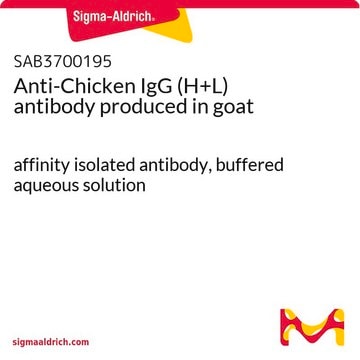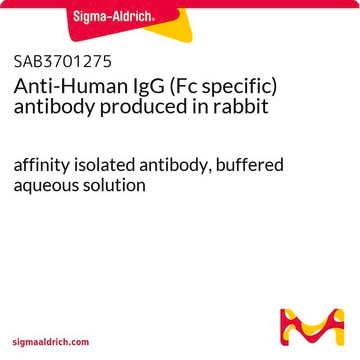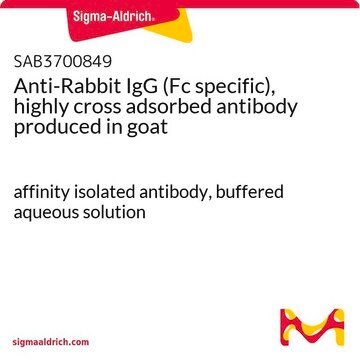SAB3700848
Anti-Rabbit IgG (Fc specific) antibody produced in goat
affinity isolated antibody, buffered aqueous solution
Anmeldenzur Ansicht organisationsspezifischer und vertraglich vereinbarter Preise
Alle Fotos(1)
About This Item
UNSPSC-Code:
12352203
NACRES:
NA.46
Empfohlene Produkte
Biologische Quelle
goat
Qualitätsniveau
Konjugat
unconjugated
Antikörperform
affinity isolated antibody
Antikörper-Produkttyp
secondary antibodies
Klon
polyclonal
Form
buffered aqueous solution
Speziesreaktivität
rabbit
Konzentration
1.99 mg/mL
Methode(n)
ELISA: suitable
immunohistochemistry: suitable
western blot: suitable
Versandbedingung
wet ice
Lagertemp.
2-8°C
Posttranslationale Modifikation Target
unmodified
Allgemeine Beschreibung
Immunoglobulin G (IgG) is a member of the immunoglobulin family and is a widely expressed serum antibody. The monomeric 150kDa structure of IgG constitutes two identical heavy chains and two identical light chains with molecular weight of 50kDa and 25kDa, respectively. The primary structure of this antibody also contains disulfide bonds involved in linking the two heavy chains, linking the heavy and light chains and resides inside the chains. IgG is further subdivided into four classes namely, IgG1, IgG2, IgG3, and IgG4 with different heavy chains, named γ1, γ2, γ3, and γ4, respectively. Limited digestion using papain cleaves the antibody into three fragments, two of which are identical and contain the antigen-binding activity. The third fragment does not possess antigen-binding activity and is known as fragment crystallizable (Fc). It interacts with cells and effector molecules. The Fc fragment contains the CH2 and CH3 domains of the antibody molecule. Maternal IgG is the only antibody transported across the placenta to the fetus. It passively immunizes the infants.
Immunoglobulin G (IgG) is made up of a γ heavy chain in the constant (C) region. The monomeric 150kDa structure of IgG constitutes two identical heavy chains and two identical light chains with molecular weight of 50kDa and 25kDa, respectively. The primary structure of this antibody also contains disulfide bonds involved in linking the two heavy chains, linking the heavy and light chains and resides inside the chains. IgG is further subdivided into four classes namely, IgG1, IgG2, IgG3, and IgG4 with different heavy chains, named γ1, γ2, γ3, and γ4, respectively. Limited digestion using papain cleaves the antibody into three fragments, two of which are identical and contain the antigen-binding activity. The third fragment does not possess antigen-binding activity and is known as fragment crystallizable (Fc). It interacts with cells and effector molecules. The Fc fragment contains the CH2 and CH3 domains of the antibody molecule. Maternal IgG is the only antibody transported across the placenta to the fetus. It passively immunizes the infants.
Spezifität
This product was prepared from monospecific antiserum by immunoaffinity chromatography using Rabbit IgG coupled to agarose. Assay by immunoelectrophoresis resulted in a single precipitin arc against Anti-Goat Serum, Rabbit IgG, Rabbit IgG F(c) and Rabbit Serum. No reaction was observed against Rabbit IgG F(ab′)2.
Immunogen
Rabbit IgG F(c) fragment
Anwendung
Anti-Rabbit IgG (Fc specific) antibody produced in goat has been used in immunohistochemistry.
Anti-Rabbit IgG (Fc specific) antibody produced in goat has been used in immunohistochemistry.
Physikalische Eigenschaften
Antibody format: IgG
Physikalische Form
Supplied in 0.02 M Potassium Phosphate, 0.15 M Sodium Chloride, pH 7.2
Haftungsausschluss
Unless otherwise stated in our catalog or other company documentation accompanying the product(s), our products are intended for research use only and are not to be used for any other purpose, which includes but is not limited to, unauthorized commercial uses, in vitro diagnostic uses, ex vivo or in vivo therapeutic uses or any type of consumption or application to humans or animals.
Sie haben nicht das passende Produkt gefunden?
Probieren Sie unser Produkt-Auswahlhilfe. aus.
Lagerklassenschlüssel
12 - Non Combustible Liquids
WGK
nwg
Flammpunkt (°F)
Not applicable
Flammpunkt (°C)
Not applicable
Hier finden Sie alle aktuellen Versionen:
Besitzen Sie dieses Produkt bereits?
In der Dokumentenbibliothek finden Sie die Dokumentation zu den Produkten, die Sie kürzlich erworben haben.
Kunden haben sich ebenfalls angesehen
Inhibition of Reactive Gliosis in the Retina of Rats with Streptozotocin-Induced Diabetes under the Action of Hydrated C60 Fullerene
Victor S
Neurophysiologia null
Inhibition of Reactive Gliosis in the Retina of Rats with Streptozotocin-Induced Diabetes under the Action of Hydrated C60 Fullerene
Victor S
Neurophysiologia null
Bryan Gosselin et al.
Analytical chemistry, 94(20), 7383-7390 (2022-05-14)
Dipstick assays using silver nanoparticles (AgNPs) stabilized by a thin calix[4]arene-based coating were developed and used for the detection of Anti-SARS-CoV-2 IgG in clinical samples. The calixarene-based coating enabled the covalent bioconjugation of the SARS-CoV-2 Spike Protein via the classical
Jin Li et al.
Molecular therapy : the journal of the American Society of Gene Therapy, 29(3), 1102-1119 (2020-12-07)
Muscle atrophy is associated with negative outcomes in a variety of diseases. Identification of a common therapeutic target would address a significant unmet clinical need. Here, we identify a long non-coding RNA (lncRNA) (muscle-atrophy-associated transcript, lncMAAT) as a common regulator
Jin Li et al.
EBioMedicine, 81, 104108-104108 (2022-06-26)
Pathological cardiac hypertrophy occurs in response to numerous stimuli and precedes heart failure (HF). Therapies that ameliorate pathological cardiac hypertrophy are highly needed. The expression level of miR-30d was analyzed in hypertrophy models and serum of patients with chronic heart
Unser Team von Wissenschaftlern verfügt über Erfahrung in allen Forschungsbereichen einschließlich Life Science, Materialwissenschaften, chemischer Synthese, Chromatographie, Analytik und vielen mehr..
Setzen Sie sich mit dem technischen Dienst in Verbindung.








